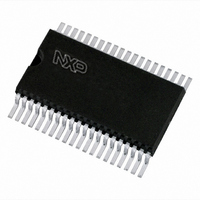PCF8566T/1,118 NXP Semiconductors, PCF8566T/1,118 Datasheet - Page 20

PCF8566T/1,118
Manufacturer Part Number
PCF8566T/1,118
Description
IC LCD DVR UNVRSL LOW-MUX 40VSOP
Manufacturer
NXP Semiconductors
Datasheet
1.PCF8566T1118.pdf
(48 pages)
Specifications of PCF8566T/1,118
Package / Case
40-VSOP
Display Type
LCD
Configuration
7 Segment + DP, 14 Segment (24 Segment)
Interface
I²C
Current - Supply
30µA
Voltage - Supply
2.5 V ~ 6 V
Operating Temperature
-40°C ~ 85°C
Mounting Type
Surface Mount
Number Of Digits
12
Number Of Segments
96
Maximum Clock Frequency
315 KHz
Operating Supply Voltage
2.5 V to 6 V
Maximum Power Dissipation
400 mW
Maximum Operating Temperature
+ 85 C
Maximum Supply Current
90 uA
Minimum Operating Temperature
- 40 C
Lead Free Status / RoHS Status
Lead free / RoHS Compliant
Digits Or Characters
-
Lead Free Status / Rohs Status
Lead free / RoHS Compliant
Other names
568-1070-2
935278688118
PCF8566TD-T
935278688118
PCF8566TD-T
NXP Semiconductors
8. Basic architecture
PCF8566_7
Product data sheet
8.1.1 Bit transfer
8.1 Characteristics of the I
Table 7.
An additional feature is for an arbitrary selection of LCD segments to be blinked. This
applies to the static and 1:2 multiplex drive modes and can be implemented without any
communication overheads. Using the output bank selector, the displayed RAM banks are
exchanged with alternate RAM banks at the blinking frequency. This mode can also be
specified by the blink select command.
In the 1:3 and 1:4 multiplex modes, where no alternate RAM bank is available, groups of
LCD segments can be blinked by selectively changing the display RAM data at fixed time
intervals.
If the entire display needs to be blinked at a frequency other than the nominal blinking
frequency, this can be done using the mode set command to set and reset the display
enable bit E at the required rate (see
The I
modules. The two lines are a Serial Data line (SDA) and a Serial Clock Line (SCL). When
connected to the output stages of a device, both lines must be connected to a positive
supply via a pull-up resistor. Data transfer is initiated only when the bus is not busy.
One data bit is transferred during each clock pulse. The data on the SDA line must remain
stable during the HIGH period of the clock pulse. Changes in the data line at this time will
be interpreted as a control signal. Bit transfer is illustrated in
Blinking mode
off
1
2
3
Fig 12. Bit transfer
2
C-bus provides bidirectional, two-line communication between different IC or
Blink frequencies
SDA
SCL
Rev. 07 — 25 February 2009
Normal operating
mode ratio
-
f
f
f
blink
blink
blink
=
=
=
2
C-bus
--------------- -
92160
------------------- -
184320
------------------- -
368640
f
f
f
clk
clk
clk
data valid
data line
stable;
Table
Universal LCD driver for low multiplex rates
9).
Power saving mode
ratio
-
f
f
f
change
allowed
of data
blink
blink
blink
=
=
=
--------------- -
15360
--------------- -
30720
--------------- -
61440
f
f
f
elk
clk
clk
Figure
mba607
Blink frequency
blinking off
2 Hz
1 Hz
0.5 Hz
12.
PCF8566
© NXP B.V. 2009. All rights reserved.
20 of 48
















